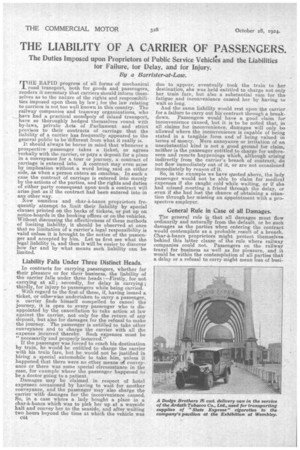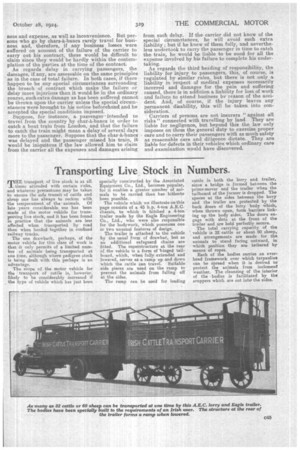THE LIABILITY OF A CARRIER OF PASSENGERS.
Page 28

Page 29

If you've noticed an error in this article please click here to report it so we can fix it.
The Duties Imposed upon Proprietors of Public Service Vehicls and the Liabilities for Failure, for Delay, and for Injury. By a. Barrister-at-Law.
THE RAPID progress of all forms of mechanical road transport, both for goods and passengers, i renders t necessary that carriers should inform themselves as to the nature of the rights and responsibilities imposed upon them by law; for the law relating to carriers is not too well known in this country. The railway companies and tramway organizations, who have had a practical morgipoly of inland transport, have so thoroughly hedged themselves round with by-laws, private Acts of Parliament and strict provisos to their contracts of carriage that the liability of a carrier has frequently appeared to the general public to bedifferent from what it really is. it should always be borne in mind that whenever a prospective passenger takes a ticket, or agrees verbally with the carrier, or pays a deposit for a place in a. conveyance for a tour or journey, a contract of carriage is entered into. A contract may even arise by implication without a word being said on either side, as when a person enters an omnibus. In such a case the contract of carriage is entered into merely by the actions of the parties, and the rights and duties of either party consequent upon such a contract will arise just as if the contract had been entered into in any other way.
Now omnibus and char-a-bancs proprietors frequently attempt to limit their liability by special clauses printed on the backs of tickets, or put up on notice-boards in the booking offices or on the vehicles. Without discussing the effectiveness of these methods of limiting liability, it should be observed at once that no limitation of a carrier's legal responsibility is • valid unless it is brought to the notice of the passenger and accepted by him. Let us first see what the legal liability is, and then it will be easier to discover how far and by what means such liability can be limited.
Liability Falls Under Three Distinct Heads.
In contracts for carrying passengers, whether for their pleasure or for their business, the liability of the carrier falls under three heads :—Firstly, for not tarrying at all ; secondly, for delay in carrying ; thirdly, for injury to passengers while being carried. With regard to the first of these, if, having issued a ticket, or otherwise undertaken to carry a passenger, a carrier finds himself compelled to cancel the journey, it is open to every passenger who is disappointed by the cancellation to take action at law against the carrier, not only for the return of any deposit, but also for damages for the refusal to make the journey. The passenger is entitled to take other conveyance and to charge the carrier with all the expense incurred thereby. Such expenses must be " necessarily and properly incurred."
If the passenger was forced to reach his destination by train, he would be entitled to charge the carrier with his train fare, but he would not be justified in hiring a special automobile to take him, unless it happened that there were no other means of conveyance or there was some special circumstance in the case, for example where the passenger happened to be a doctor going to a patient.
Damages may be claimed in respect of hotel expenses occasioned by having to wait for another conveyance, and the passenger may also charge the carrier with damages for the inconvenience caused. So, in a case where a lady bought a place in a char-a-bancs which was to pick her up at a wayside halt and convey her to the seaside, and after waiting two hours beyond the time at which the vehicle was c44 due to appear, eventually took the train to her destination, she was held entitled to charge not only her train fare, but also a substantial sum for the fatigue and inconvenience caused her by having to wait so long.
And the same liability would rest upon the carrier for a failure to carry out his contract through a breakdown. Passengers would have a good claim for inconvenience caused, but it is to be noted that, in all claims for inconvenience, damages will only be allowed where the inconvenience is capable of being stated in a tangible form and of being valued in terms of money. Mere annoyance or irritation of an unsubstantial kind is not a good ground for claim, neither is the passenger entitled to charge for unforeseen and remote happenings which, although arising indirectly from the carrier's breach of contract, do not flow immediately out of it, or are not occasioned immediately by reason of it.
So, in the example we have quoted above, the lady passenger would not be able to claim for medical expenses if she caught cold while waiting, or if she had missed meeting a friend through the delay, or even if she had lost the chance of obtaining a situation through her missing an appointment with a prospective employer.
General Rule in Case of all Damages.
The general rule is that all damages must flow ordinarily and naturally from the default, or be such damages as the parties when entering the contract would contemplate as a probable result of a breach. Char-à-banes proprietors might protect themselves behind this latter clause of the rule where railway companies could not. Passengers on the railway travel for business as well as for pleasure, and it would be within the contemplation of all parties that a delay or a refusal to carry might mean loss of busi
ness and expense, as well as inconvenience. But persons who go by chars-a-banes rarely travel for business and, therefore, if any business losses were suffered on account of the failure of the carrier to carry out his contract, these would be difficult to claim since they would be hardly within the contemplation of the parties at the time of the contract. As regards delay in carrying passengers, the damages, if any, are assessable on the same principles as in the case of total failure. In both cases, if there happen to be any special circumstances surrounding the breach of contract which make the failure or delay more injurious than it would be in the ordinary course, such extra damage as has been suffered cannot be thrown upon the carrier unless the special circumstances were brought to his notice beforehand and he accepted the special conditions imposed. Suppose, for instance, a passenger intended to travel from the country by char-h-bancs in order to catch a boat train from London, and that the failure to catch the train might mean a delay of several days more to the passenger. Suppose that the char-h-bancs was delayed and the passenger missed his train, it would be iniquitous if the law allowed him to claim from the carrier all the expenses and damages arising from such delay. If the carrier did not know of the special circumstances, he will avoid such extra liability ; but if he knew of them fully, and nevertheless undertook to carry the passenger in time to catch thetrain, he would be liable to be sued for all the expense involved by his failure to complete his undertaking. As regards the third heading of responsibility, the liability for injury to passengers, this, of course, is regulated by similar rules, but there is not only a, liability in respect of medical expenses necessarily incurred and damages for the pain and suffering caused, there is in addition a liability for loss of work and failure to attend business by reason of the accident. And, of course, if the injury leaves any permanent disability, this will be taken into consideration.
Carriers of persons are not insurers "against all risks" connected with travelling by land They are liable for negligence, but beyond this the law only imposes on them the general duty to exercise proper care and to carry their passengers with as much safety as reasonable care and diligence dictate. They are liable for defects in their vehicles which ordinary care and examination would have discovered.




































